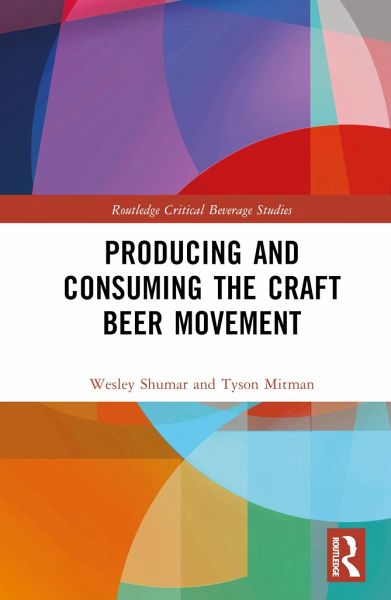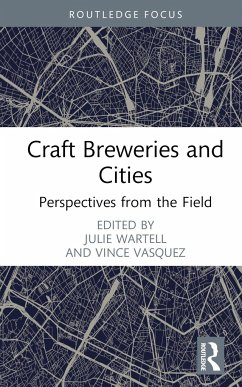Producing and Consuming the Craft Beer Movement
Versandkostenfrei!
Versandfertig in 1-2 Wochen
Weitere Ausgaben:

PAYBACK Punkte
75 °P sammeln!




Producing and Consuming the Craft Beer Movement is an ethnographic analysis of the craft beer movement and its rapid development as an industry that articulated a different set of values: celebrating, quality, community, and good taste.
Wesley Shumar is a Professor in the Department of Communication at Drexel University. His research is focused on the commodification of culture, the cultural production of value, the transformation of space, time, and communicative interaction through digital technologies, and the social and interactive processes of learning. His work on higher education focuses on the cultural and spatial transformation of American universities within an increasingly consumerist economy. His work on learning focuses on the ways the internet and digital technologies can enhance learning interactions. He is currently exploring the craft economy and the production of value. He is author of College for Sale: A Critique of the Commodification of Higher Education, and Inside Mathforum.org: Analysis of an Online Mathematics Education Community. He is also the co-editor of Structure and Agency in the Neoliberal University and Building Virtual Communities: Learning and Change in Cyberspace. Tyson Mitman is a senior lecturer in Sociology and Criminology at York St John University. His research examines space and culture. Specifically, how culture and space intersect and interact with each other, how we make our lives through the cultural groups and practices we value, and how we position and debate power, identity, and representation though how we construct differing cultural groups and how those groups are differently allowed to use public and private spaces. Much of his research has been about public aesthetics and graffiti culture. It has focused on how individuals who write graffiti construct their identity within their subculture, how their interaction with public space produces a type of political discourse, and how graffiti affects spaces and those who use those spaces. He is the author of The Art of Defiance: Graffiti, Politics, and the Reimagined City in Philadelphia. He cares deeply about craft beer and respects the producers who are driven by a desire to produce the best product they can, not merely the most profitable one. He believes, at its best, craft beer (and most craft production) helps make caring and informed communities who are capable of resisting the corporate mediocrity mass production so often tries to heap onto all of us.
Produktdetails
- Routledge Critical Beverage Studies
- Verlag: Taylor & Francis Ltd
- Seitenzahl: 166
- Erscheinungstermin: 31. März 2023
- Englisch
- Abmessung: 240mm x 161mm x 14mm
- Gewicht: 380g
- ISBN-13: 9780367625597
- ISBN-10: 0367625598
- Artikelnr.: 66751109
Herstellerkennzeichnung
Libri GmbH
Europaallee 1
36244 Bad Hersfeld
gpsr@libri.de
Für dieses Produkt wurde noch keine Bewertung abgegeben. Wir würden uns sehr freuen, wenn du die erste Bewertung schreibst!
Eine Bewertung schreiben
Eine Bewertung schreiben
Andere Kunden interessierten sich für














